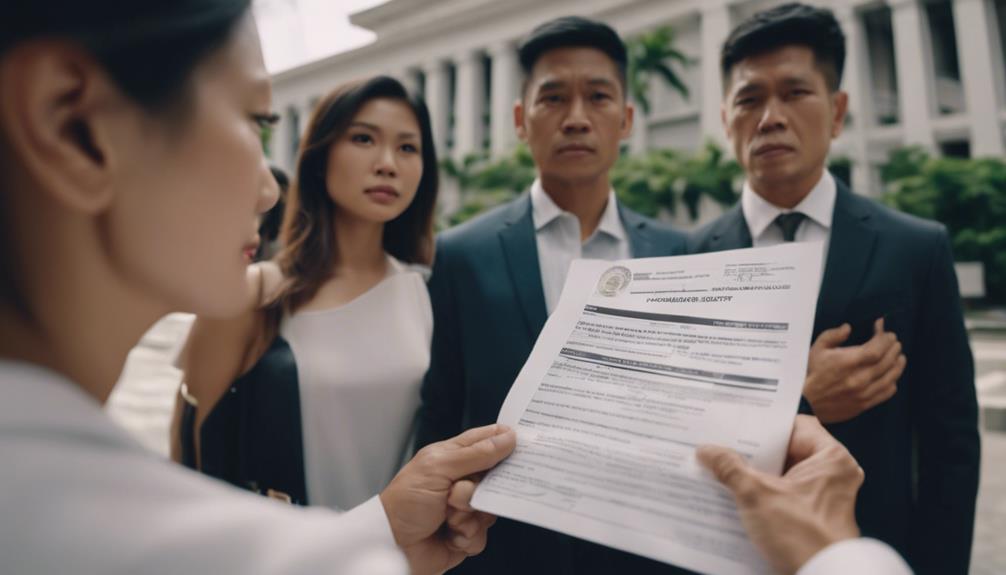Handling recognition of a foreign divorce in the Philippines requires the submission of a petition in the Regional Trial Court along with necessary documentation: foreign divorce decree, marriage certificate, and relevant laws. It is essential to hire a lawyer to ensure compliance. Select the appropriate venue based on the marriage location or the residence of the Filipino spouse. Adhere to court requirements diligently for a successful recognition process. The duration can vary, taking anywhere from months to over a year due to legal proceedings. Costs can range from hundreds to thousands of dollars, including legal fees and court charges. Following the legal steps accurately and maintaining clear communication with a specialized lawyer will guarantee a smooth recognition process. Further details are available.
Key Takeaways
- Hire a lawyer for filing in Regional Trial Courts.
- Prepare foreign divorce decree, marriage certificate, and passport copies.
- Select proper venue for filing recognition petition.
- Be patient for court process duration, varying from months to over a year.
- Ensure accurate details, authenticated documentation, and legal expertise for successful recognition.
Importance of Recognizing Foreign Divorce
Recognizing a foreign divorce in the Philippines is important for Filipino individuals looking to establish legal clarity and move forward with their lives. By having a foreign divorce recognized in the Philippine legal system, individuals can remarry legally and make sure that their conjugal property rights are accurately reflected on their Philippine Marriage Certificate.
This recognition also plays an essential role in avoiding legal issues related to inheritance, properties, and spousal support. It clarifies the rights to conjugal property, paving the way for a smoother process when marrying another Filipino in the future. Additionally, obtaining loans from Philippine banks without interference from an ex-spouse becomes feasible once the foreign divorce is recognized.
Therefore, the recognition of foreign divorce isn't only beneficial for individuals seeking to remarry but also for safeguarding their legal rights and avoiding potential complications in the future.
Filing Process in Regional Trial Court
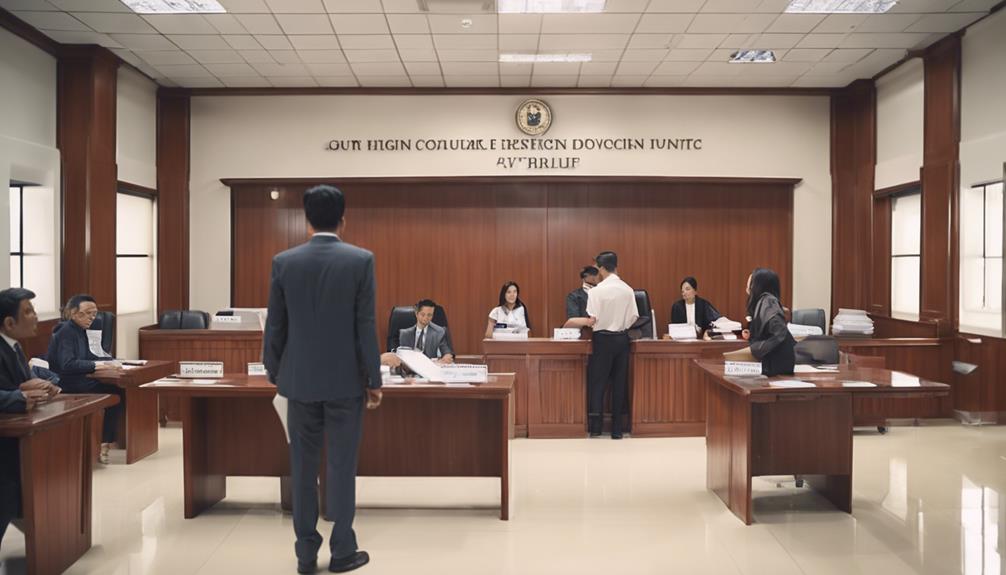
When filing for recognition of a foreign divorce in the Philippines, one must submit a Petition for Recognition of Foreign Divorce in the Regional Trial Court. This legal process involves presenting the foreign divorce decree and the relevant foreign divorce law to the Philippine court for validation.
Hiring a lawyer is essential during this process to guarantee all legal requirements and procedures are accurately followed. It's important to provide your attorney with full disclosure of all relevant marriage, divorce, and citizenship details to facilitate a successful filing in the Regional Trial Court.
Additionally, assembling necessary documents such as marriage certificates, divorce papers, and proofs of citizenship is a pivotal part of the filing process. By adhering to these steps and seeking professional legal assistance, individuals can navigate the complexities of getting a foreign divorce recognized in the Philippines efficiently and effectively.
Required Documentation for Petition
When seeking to have a foreign divorce recognized in the Philippines, individuals must make sure they have the necessary documentation in order. This includes presenting the foreign divorce decree, certificate of finality, and the PSA-issued marriage certificate.
Additionally, providing passport copies and obtaining English translations of all relevant documents and foreign divorce laws are important steps in the recognition process.
Document Authentication Process
Gathering the necessary documents for the petition involves obtaining a valid foreign divorce decree, certificate of finality, PSA-issued marriage certificate, passport copies, and supporting documents.
To guarantee recognition by Philippine courts, the foreign divorce decree must be valid and apostilled, accompanied by an English translation. Additionally, a certified copy of the foreign country's divorce law is required.
The PSA-issued marriage certificate serves as proof of the marriage that was dissolved. Proper documentation is essential for the document authentication process to proceed smoothly.
Court Decision Translation
To guarantee the proper review and understanding of the foreign court decision, a translated version into English is a necessary requirement for the Petition for Recognition of Foreign Divorce in the Philippines.
The translation of the court decision plays an essential role in facilitating the Philippine court's assessment of the foreign divorce. By providing a translated document, the parties involved ensure that the Philippine court can accurately interpret and analyze the contents of the foreign court decision.
This step is important in the legal process of recognizing a foreign divorce in the Philippines, as it enables the court to make informed decisions based on a thorough understanding of the case.
Certified translation services may be necessary to ensure the accuracy and authenticity of the translated court decision. By presenting a properly translated court decision, petitioners can strengthen their case and increase the likelihood of their foreign divorce being recognized in the Philippines.
Venue for Filing Petition
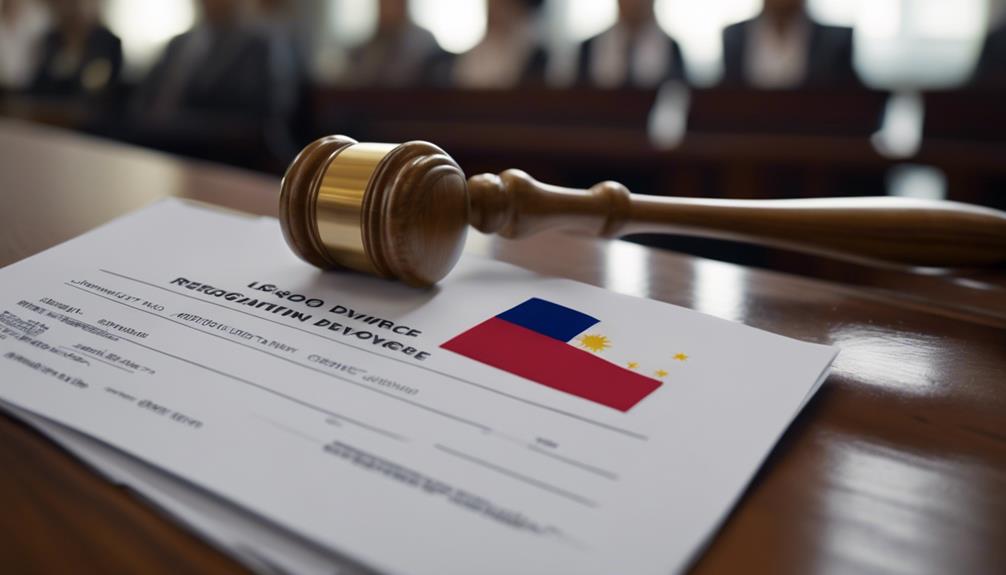
The Regional Trial Court in the Philippines is the designated venue for filing a Petition for Recognition of Foreign Divorce. When initiating the process, it's important to choose the proper venue, typically where the marriage was celebrated or where the Filipino spouse resides.
The Regional Trial Court holds the authority to review and validate the foreign divorce for recognition within the Philippines. Selecting the correct court venue is essential for the efficient processing and legal recognition of a foreign divorce in the country.
By ensuring that the petition is filed in the appropriate Regional Trial Court, individuals seeking to recognize a foreign divorce can navigate the process smoothly. This venue selection plays a critical role in initiating the legal proceedings required for recognizing a foreign divorce in the Philippines.
Understanding the significance of the venue for filing the petition is essential in pursuing the recognition of a foreign divorce within the country's legal system.
Court Process for Divorce Recognition

When proceeding through the court process for divorce recognition in the Philippines, individuals must adhere to specific requirements for filing, including submitting the foreign divorce decree and relevant foreign divorce law.
It's imperative to secure legal representation to guide through the intricate legal proceedings and effectively present the case in court.
Understanding the timeline for recognition is essential to anticipate the duration of the process and plan accordingly for the validation of the foreign divorce.
Court Filing Requirements
Filing a Petition for Recognition of Foreign Divorce in the Regional Trial Court involves submitting essential documents for court validation. The court filing requirements include presenting the foreign divorce decree, certificate of finality, and the foreign country's divorce law to establish the legitimacy of the divorce.
Judicial review is part of the court process to verify that the foreign divorce meets the legal standards for recognition in the Philippines. Proper documentation is vital during the court filing, and the submission of clear and accurate documents is necessary for the court's assessment.
To navigate through this process successfully, hiring a lawyer is highly recommended. A lawyer can assist in handling the court filing requirements, organizing the necessary documents, and presenting a strong case for the recognition of the foreign divorce. With the guidance of a lawyer, individuals seeking recognition of their foreign divorce stand a better chance of achieving a positive outcome in the Philippine court system.
Legal Representation Needed
Engaging a specialized Philippine lawyer is essential when maneuvering through the court process for foreign divorce recognition in the Philippines. The lawyer plays an important role in assisting the petitioner, usually the Filipino spouse, in filing a Petition for Recognition of Foreign Divorce at the Regional Trial Court.
Their expertise is critical in preparing the necessary documents, presenting the case in court, and ensuring compliance with legal procedures. To guarantee a smooth court process, full disclosure of marriage and divorce details, as well as citizenship information, to the lawyer is imperative.
The accuracy and clarity of submitted documents are paramount for assessment and validation by the court during the divorce recognition process. Additionally, the lawyer guides the petitioner in certifying Philippine documents with the appropriate government office and foreign documents with the relevant foreign office for legal recognition.
Legal representation is fundamental for maneuvering through the complexities of the court system in the Philippines when seeking recognition of a foreign divorce.
Timeline for Recognition
How long does the court recognition process for a foreign divorce in the Philippines typically take?
The timeline for recognizing a foreign divorce in the Philippines can vary, influenced by factors such as court proceedings and document submissions.
The process usually commences with the filing of a Petition for Recognition of Foreign Divorce in the Philippine Regional Trial Court, triggering a legal review.
Court hearings, legal arguments, and the submission of necessary documents can potentially prolong the timeline for foreign divorce recognition.
Delays might arise due to requirements for additional documentation, scheduling constraints within the court system, or any legal disputes that may emerge during the recognition process.
Ensuring the timely completion of all required paperwork, attending court hearings as necessary, and strictly adhering to legal procedures can aid in expediting the recognition of a foreign divorce in the Philippines.
Filing From Abroad Possibilities

When residing outside the Philippines, individuals can still pursue the recognition of a foreign divorce in the country. Filing from abroad involves submitting necessary documents to the Philippine Regional Trial Court for validation.
It's important to verify the authenticity and accuracy of all submitted documents to support the foreign divorce recognition process. The court will carefully review the foreign divorce decree along with other supporting documents to determine their validity.
If the recognition is successful, the divorce will be annotated on Philippine marriage records, reflecting the updated marital status. This annotation is vital for legal purposes and to ensure that the divorce is recognized within the Philippine jurisdiction.
Individuals seeking to have their foreign divorce recognized in the Philippines from abroad must gather and submit the required documentation accurately to facilitate the process smoothly.
Duration of Recognition Process

The timeline for recognizing a foreign divorce in the Philippines varies depending on the court's workload and the complexity of the case. On average, the process can take several months to over a year to complete. Factors such as document authentication, court hearings, and legal procedures contribute to the overall duration of the recognition process. Delays in obtaining required documents, scheduling court appearances, and processing paperwork can extend the timeline for finalizing the recognition of a foreign divorce. It is crucial to remain patient and cooperate closely with legal counsel to navigate through the recognition process efficiently and effectively.
| Factors Affecting Duration of Recognition Process | |
|---|---|
| Court's Caseload | May impact the scheduling of hearings |
| Complexity of the Case | Determines the length of legal procedures |
| Document Authentication | Required for verifying foreign divorce |
| Scheduling Court Appearances | Can cause delays in the recognition process |
| Processing Paperwork | Necessary for finalizing the recognition |
Cost of Divorce Recognition
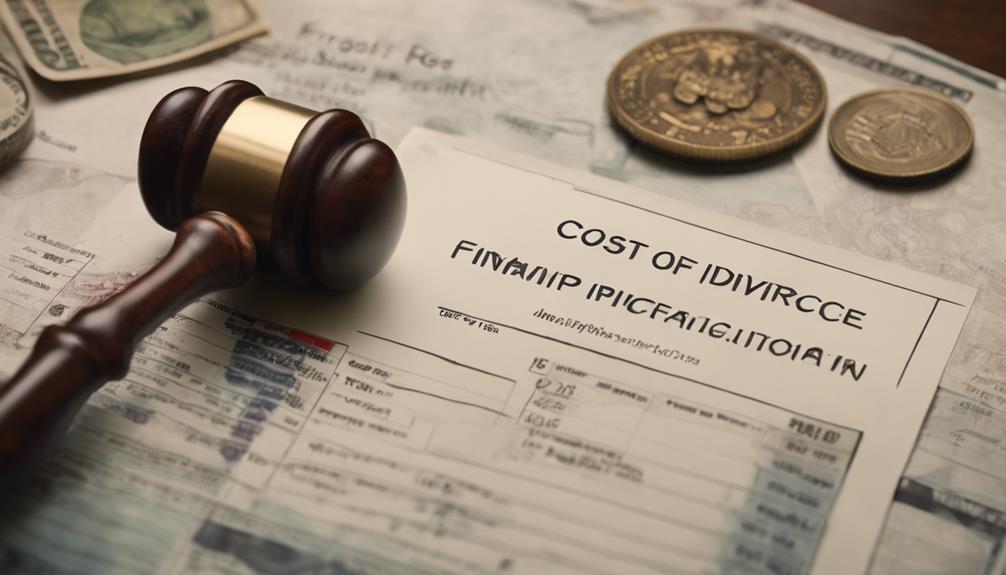
Costs associated with recognizing a foreign divorce in the Philippines can vary based on factors such as legal fees, document authentication, and court processing fees. When considering the total cost of getting a foreign divorce recognized, individuals should be aware of the following:
- Legal fees for filing a Petition for Recognition of Foreign Divorce in the Philippine Regional Trial Court can range from a few hundred to several thousand dollars.
- Additional expenses may include notarization, translation of documents, travel costs, and fees for obtaining necessary documents from the foreign country.
- Court processing fees for submitting the Petition for Recognition of Foreign Divorce in the Philippines can vary from a few hundred to over a thousand dollars.
- The overall cost of having a foreign divorce recognized in the Philippines can accumulate to a significant amount, incorporating legal fees, document authentication, and court expenses.
Tips for Successful Recognition
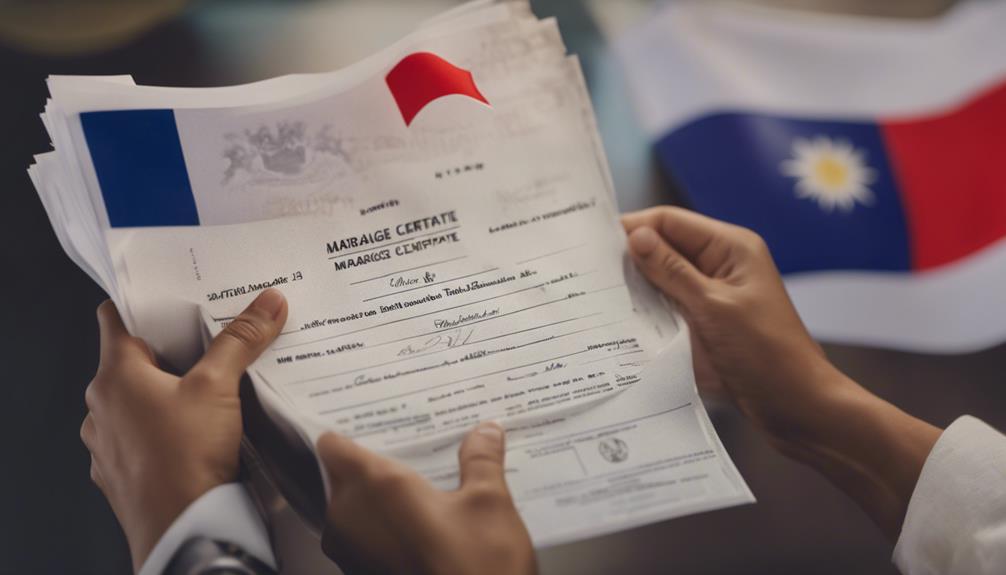
To guarantee a successful recognition of a foreign divorce in the Philippines, individuals should focus on three key points:
- Gathering all required legal documents.
- Completing the consular authentication process.
- Understanding the court recognition procedure thoroughly.
By meticulously preparing the necessary paperwork, following the proper authentication steps, and being well-versed in the court's requirements, one can increase the chances of having their foreign divorce recognized in the Philippines.
Working closely with a specialized lawyer and maintaining clear communication with the Regional Trial Court are also vital steps in achieving a smooth and successful recognition process.
Required Legal Documents
Collecting the essential legal documents is important for ensuring the successful recognition of a foreign divorce in the Philippines.
To navigate this process smoothly, individuals must have a valid foreign divorce decree with a certificate of finality in hand.
Besides these important documents, it's necessary to prepare copies of the Philippine Marriage Certificate and passport.
Obtaining a certified copy of the foreign country's divorce law is also necessary for validation purposes.
Additionally, providing English translations of all divorce documents, if they aren't already in English, is mandatory.
Once all the required documents are gathered, they must be submitted to the proper authorities for recognition in the Philippines.
Consular Authentication Process
How can individuals guarantee successful recognition of their foreign divorce in the Philippines through the consular authentication process?
The consular authentication process involves validating foreign divorce documents at the Philippine Embassy or Consulate in the country where the divorce was granted. This step is essential as it confirms that the foreign divorce decree is officially recognized by Philippine authorities.
The Philippine Embassy or Consulate provides the necessary stamp or seal on the foreign divorce documents to indicate authenticity.
To achieve successful recognition, individuals must present the authenticated documents to the Philippine Regional Trial Court for judicial review. By following the consular authentication process diligently, individuals can increase the chances of their foreign divorce being recognized in the Philippines.
It's important to adhere to the specific requirements and guidelines set forth by both the Philippine Embassy and the Philippine Regional Trial Court to facilitate the recognition of the authenticated documents.
Court Recognition Procedure
Why is it essential to thoroughly prepare all required documents before initiating the court recognition process for a foreign divorce in the Philippines?
Proper documentation is fundamental for a successful court recognition of a foreign divorce in the Philippines. To guarantee a smooth process, here are some key tips:
- Legal Accuracy: Accuracy and completeness of all required documents, such as the foreign divorce decree and proof of divorce legality, are paramount for court recognition.
- Experienced Lawyer: Hiring a knowledgeable lawyer experienced in handling Petitions for Recognition of Foreign Divorce can significantly enhance the chances of a successful recognition.
- Disclosure of Details: Properly disclosing all relevant details, dates, and locations related to the marriage and divorce to your lawyer is essential for a successful recognition process.
- Authentication of Documentation: Presenting clear and authenticated documentation to the court, including marriage certificates, divorce papers, and proofs of citizenship, is crucial for a successful recognition of a foreign divorce.
Legal Expertise and Assistance

Seeking legal expertise from a specialized Philippine lawyer is essential when working towards the recognition of a foreign divorce in the Philippines. Maneuvering through the intricate recognition process requires proper assistance to make sure all legal procedures are followed correctly.
It's important to disclose all marriage, divorce, and citizenship details accurately to your lawyer. By providing your lawyer with precise information, you enhance the chances of a successful outcome. Accurate document submission and thorough case preparation play a critical role in the recognition process.
A specialized Philippine lawyer can assist in obtaining the necessary documents and presenting them effectively in court. Their expertise can guide you through the complexities of the legal system, increasing the likelihood of a favorable recognition of your foreign divorce.
Hence, entrusting your case to a knowledgeable legal professional is key to achieving a successful outcome in the recognition process.
Frequently Asked Questions
Can a Foreign Divorce Be Recognized in the Philippines?
Yes, a foreign divorce can be recognized in the Philippines for marriages involving a Filipino and a foreigner. This recognition allows a Filipino spouse to remarry following Philippine law.
The process entails filing a Petition for Recognition of Foreign Divorce in the Regional Trial Court. It's important to present the foreign divorce decree and evidence of its validity for court validation.
Proper documentation and adherence to legal procedures are necessary for the recognition of a foreign divorce in the Philippines.
Can Divorce Be Approved in the Philippines?
Divorce isn't approved in the Philippines for Filipino citizens. However, a Filipino spouse can remarry upon the validation of a valid foreign divorce decree by a Philippine court. This process involves judicial review to confirm compliance with Philippine laws.
Once validated, the court decision serves as the basis for annotating civil registry records. Guidelines set by the Office of the Civil Registrar General outline the procedures for acknowledging foreign-issued divorce decrees.
Will My US Divorce Be Recognized Overseas?
Recognizing a US divorce overseas can vary depending on the country's laws. Factors such as the validity of the divorce decree and compliance with local regulations play a critical role in recognition.
It's important to consult legal experts familiar with international divorce procedures to navigate the complexities effectively. Ensuring all necessary documentation is in order will facilitate the recognition process and help individuals move smoothly through marital status updates in foreign jurisdictions.
Can I Remarry Without Annulment in the Philippines?
In the Philippines, a Filipino spouse can remarry without annulment if they obtain a valid foreign divorce decree. However, this is only applicable if the divorce was initiated by the foreign spouse and is recognized under Philippine law. The Filipino spouse must present the foreign divorce decree to the proper court in the Philippines for judicial recognition to officially remarry. In unrelated legal matters, issues such as owning a gun with felon spouse can also present unique challenges depending on the laws and circumstances surrounding the situation.
However, recognition of the foreign divorce by a Philippine court is essential for remarriage. This judicial review process is necessary to validate the foreign divorce and allow the Filipino spouse to remarry.
The decision of the Philippine court acts as the foundation for annotating the civil registry with the foreign divorce, enabling the Filipino spouse to remarry without the need for annulment.
Conclusion
To sum up, successfully managing the process of having a foreign divorce acknowledged in the Philippines can be intricate but with the right documentation, legal expertise, and patience, it's possible to achieve recognition.
By following the required procedures and understanding the court process, individuals can guarantee that their foreign divorce is acknowledged in the Philippine legal system.
Remember, thorough preparation and attention to detail are key to a successful recognition process.
